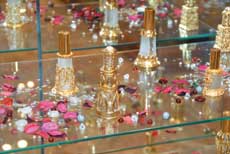WITH the number of western perfumes flooding the market in the Middle East, it is easy to forget that Europeans learned the art of perfumery from the Arabs. France has been the perfume center of Europe since the 16th century but the first liquid perfumes were prepared as long ago as 3500 BC in Egypt. And the earliest form of perfume was incense which exudes a scent as it is burned; hence the word “perfume” is derived from the Latin “per fumum,” meaning “through smoke”.
The sale of European and American perfumes (the United States has become the world’s leading producer and consumer of perfumes) still dominates in Saudi Arabia but things are slowly changing. In Egypt, in the Gulf and in the Kingdom, men and women still prefer European perfumes but they are coming back to traditional perfumes,” says Rimaz Waleed.
A newcomer on the perfume scene, Rimaz is reinventing the traditional art of perfumery. Her exclusive perfumes are attracting an increasing number of customers across the Arab world. Unlike European toilet waters which quickly evaporate, (especially the inexpensive imitations known as ‘knockoffs’), her original scents remain long after they have been sprayed.
Her flagship perfume, Rimaz, bears her name. Its success is due to its amazing durability: It wears off only after three days. She has also created special perfumes for clothes and for men’s ghutras (headdress). From earliest times, both Arab men and women have scented their clothes with incense but nowadays both tend to spray their clothes with perfume instead of wafting incense into their robes and abbayas.
Rimaz Waleed’s forte lies in her ability to create personalized perfumes: “Once I create a perfume for a client, it is never made or sold to someone else. A growing number of men and women are interested in having a unique perfume created for their own exclusive use.” When the clients approve of the fragrance specially created for them, the secret recipe may be used to perfume a complete line of toiletries such as toilet water, body spray, body lotion, bath oil, shower gel, body scrub, liquid hand soap and even hair gel.
Rimaz Waleed’s fascination with perfumes dates from her childhood in Riyadh. “I used to mix my mother’s perfumes in empty bottles and create new scents. It took me a long time before I decided to pursue this passion. One day when I was feeling particularly unhappy and ill at ease, I went to see a psychologist. He saw through me immediately and told me that I was terribly frustrated. He suggested I do what gave me pleasure and satisfaction. From that day, I never looked back and decided to pursue my dream of creating perfumes” she says.
Perfumes may contain as many as a hundred ingredients. Each perfume is composed of a top note, the volatile scent perceived immediately.The middle note gives the fragrance its main character and finally the end note is the most persistent. Also called the base note, the end note becomes apparent when the top and middle notes have faded and the least volatile components of the perfume remain.
Perfumes are generally classified according to one dominant odor. The floral group blends odors such as jasmine, rose, gardenia, lily of the valley. The spicy group includes aromas such as carnation, clove, cinnamon, and nutmeg. The woody group is vetiver, sandalwood and cedarwood. The oriental family combines diverse notes such as vanilla, balsam and musk and the herbal group features the aromas of clover and sweet grass.
Rimaz acknowledges her preference for amber and oud. Their aroma remains longer than other ingredients. She advises her customers to use a different scent during the day. “In the evening, one should wear a heavier fragrance. And one should not keep the same perfume the whole year round. I create special perfumes for the winter and the summer seasons.”
Rimaz is very particular about the quality of the ingredients she uses. She chooses only the best and will bring ‘oud‘ from as far away as Cambodia and India. She doesn’t use any synthetic products and concocts her secret fragrant formulas exclusively using natural products. Once she has chosen the perfume’s aromatic ingredients, she uses a fixative such as ambergris or musk to hold the fragrance together and prevent its quick evaporation.
The success of her perfumes and beauty products reminds us that scent making is a traditional Arabian industry. The inhabitants of the Arabian Peninsula produced the finest incense and ‘attar’ and furthermore, they were and still are phenomenal consumers.


